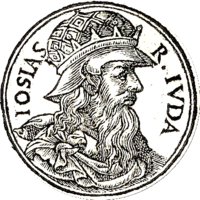
Back Josia Afrikaans يوشيا ملك يهوذا Arabic يوشيا ملك يهوذا ARZ Іасія (цар іўдзейскі) Byelorussian Yoshia Breton Josies Catalan Jóšijáš Czech Josija Danish Joschija German Ιωσίας Greek
| Josiah | |
|---|---|
 Josiah from Guillaume Rouillé's Promptuarii Iconum Insigniorum, 1553 | |
| King of Judah | |
| Reign | 640–609 BCE |
| Predecessor | Amon |
| Successor | Jehoahaz |
| Born | c. 648 BCE probably Jerusalem |
| Died | Tammuz (July/August) 609 BCE (aged 38–39) Jerusalem |
| Spouse | Zebudah Hamutal |
| Issue | Johanan Jehoiakim Zedekiah Jehoahaz |
| House | House of David |
| Father | Amon |
| Mother | Jedidah |
Josiah (/dʒoʊˈsaɪ.ə/)[1][2] or Yoshiyahu[a] was the 16th King of Judah (c. 640–609 BCE). According to the Hebrew Bible, he instituted major religious reforms by removing official worship of gods other than Yahweh. Until the 1990s, the biblical description of Josiah’s reforms were usually considered to be more or less accurate, but that is now heavily debated.[3] According to the Bible, Josiah became king of the Kingdom of Judah at the age of eight, after the assassination of his father, King Amon and reigned for 31 years, from 641/640 to 610/609 BCE.[4]
Josiah is known only from biblical texts; no reference to him exists in other surviving texts of the period from Egypt or Babylon, and no clear archaeological evidence, such as inscriptions bearing his name, has ever been found.[5] However, a seal bearing the name "Nathan-melech," the name of an administrative official under King Josiah according to 2 Kings 23:11, dating to the 7th century BCE, was found in situ in an archeological site in Jerusalem. The discoverers believe this seal represents the individual mentioned in 2 Kings 23:11.[6] Additionally, most scholars believe that Josiah existed historically and that the absence of documents is due to few documents of any sort surviving from this period, and to Jerusalem having been occupied, conquered, and rebuilt over thousands of years.[7]
- ^ Wells, John C. (1990). Longman Pronunciation Dictionary. Harlow, England: Longman. p. 386. ISBN 0-582-05383-8. entry "Josiah"
- ^ "Josiah" Dictionary.com. Retrieved 25 July 2011
- ^ Grabbe, Lester L. (2017). Ancient Israel: What Do We Know and How Do We Know It?. Bloomsbury Publishing. p. 249. ISBN 978-0-567-67044-1.
It was once conventional to accept Josiah's reform at face value, but the question is currently much debated (Albertz 1994: 198–201; 2005; Lohfink 1995; P. R. Davies 2005; Knauf 2005a).
- ^ Edwin Thiele, The Mysterious Numbers of the Hebrew Kings, (1st ed.; New York: Macmillan, 1951; 2d ed.; Grand Rapids: Eerdmans, 1965; 3rd ed.; Grand Rapids: Zondervan/Kregel, 1983). ISBN 0-8254-3825-X, 9780825438257, 217.
- ^ Alpert, Bernard; Alpert, Fran (2012). Archaeology and the Biblical Record. Hamilton Books. p. 74. ISBN 978-0-7618-5835-5.
- ^ Mendel-Geberovich, Anat; Shalev, Yiftah; Bocher, Efrat; Shalom, Nitsan; Gadot, Yuval (2019). "A Newly Discovered Personal Seal and Bulla from the Excavations of the GivꜤati Parking Lot, Jerusalem". Israel Exploration Journal. 69 (2): 154–174. ISSN 0021-2059. JSTOR 27098633.
- ^ Evans, Paul S. (2020). "The Later Monarchy in History and Biblical Historiography". In Kelle, Brad E.; Strawn, Brent A. (eds.). The Oxford Handbook of the Historical Books of the Hebrew Bible. Oxford University Press. p. 121. ISBN 978-0-19-007411-1.
Cite error: There are <ref group=lower-alpha> tags or {{efn}} templates on this page, but the references will not show without a {{reflist|group=lower-alpha}} template or {{notelist}} template (see the help page).
© MMXXIII Rich X Search. We shall prevail. All rights reserved. Rich X Search